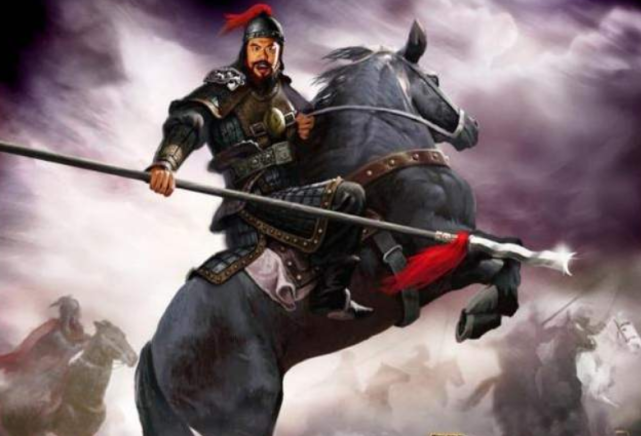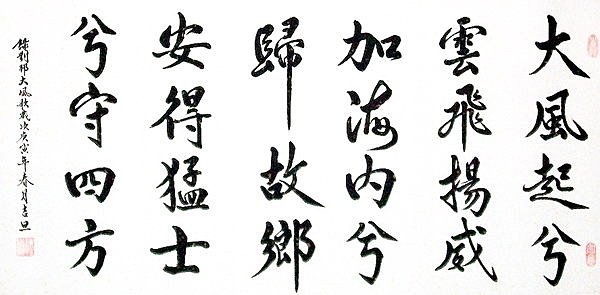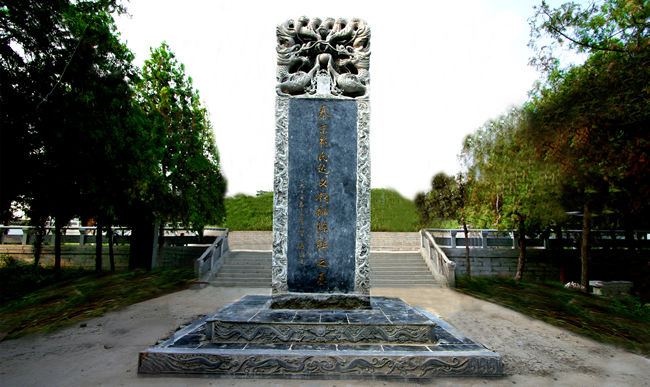
Born in a peasant family, Liu Bang was a generous and optimistic boy. The only problem was Liu Bang was too lazy to farm and continuously rebuked by his father. His neighbors found him was useless and want of lofty aspirations. Liu Bang went on unaffected. However, Liu Bang admired a local gentleman named Wei Wuji so that he sought to be a hanger-on. Unfortunately, his icon died soon.

Later, Liu Bang became a Tingzhang (like a police inspector) of Sishui Ting, Peixian county. His main job was to escort prisoners or laborers to corvee and safeguard the place. He was terrible at his job, but his generosity and sense of justice won some popularity. He took advantage of his position and became a freeloader to many families. He even had a son with a married woman. One time, Liu Bang was escorting some prisoners to Xianyang (the capital of the Qin dynasty), and he saw the Qin Shi Huang on the imperial visit. He was deeply impressed by the scene and said: “a man should be like this!”
In the mid-30s, Liu Bang married his first wife, Lv Zhi. Her father was a local landlord who saw something extraordinary in Liu Bang and insisted on marrying his daughter to him. Liu Bang had two children with Lv Zhi, namely Princess Luyuan and Liu Ying. One day, Lv Zhi and her children were weeding in fields, and an old man came by for water. Lv Zhi gave him some water and food. The old man told Lv Zhi that she and her children would be dignitary people someday. Lv Zhi was pleased and shared the news with Liu Bang, who hurried up to ask the old man about his fortune. Liu Bang was told that he would be someone very dignified.
In October 210 B.C, Liu Bang acted under orders to escort prisoners to Mount Lishan, but many escaped. Considering that letting prisoners go was a capital crime for the escorting officials, Liu Bang freed the rest of the prisoners and took a dozen of them to a secluded mountain.

Next year, Chen Sheng and Wu Guang launched an uprising against the Qin dynasty in Daze county (today’s Suzhou city, Anhui). Many local officials supported the rebellion, so did the magistrate of Peixian county. Liu Bang was called back to Peixian. However, when he arrived at his hometown, only to find that his boss, the magistrate, changed his mind and wouldn’t let him in. Liu Bang successfully turned the inner people to murder the magistrate and got into the county. Since then, Peixian county became the base camp of Liu Bang’s army. Liu Bang was titled Lord Pei.
Xiang Liang was the son of Xiang Yan, a famous general of the Chu State. As an old aristocrat, he wanted to overturn Qin Shi Huang’s rule and restore the Chu State. Whenhe heard Chen Sheng began to fight against the Qin court, Xiang Liang rekindled his dream and recruited many people from old Chu State. His army grew bigger and became one of the significant rebellious powers. He had a nephew named Xiang Yu, who was very brave and mighty in the military. Xiang Liang often sent Xiang Yu to conquer those who dared to oppose him.
Whenhe heard Chen Sheng began to fight against the Qin court, Xiang Liang rekindled his dream and recruited many people from old Chu State. His army grew bigger and became one of the significant rebellious powers. He had a nephew named Xiang Yu, who was very brave and mighty in the military. Xiang Liang often sent Xiang Yu to conquer those who dared to oppose him.
In September 208, the news that Xiang Liang was killed during the war against Zhang Han in Dingtao (today’s Heze, Shandong) broke to the King of the Chu, and the entire rebelling army was shocked. They then decided to move the capital from Xuyi (today’s Huaian, Jiangsu) to Pengcheng (today’s Xuzhou, Jiangsu). Liu Bang was named Lord Wu’an, and Xiang Yu was named Lord Chang’an.
At the time, the Qin general Zhang Han was in great power. He turned his sword to the Zhao State in the north. King of the Zhao State asked help from the King of the Chu, who sent Song Yi and Xiang Yu to rescue the Zhao State and Liu Bang to attack the Qin army in the west. A pact that anyone who broke into Xianyang (the capital city of the Qin court) first would be titled as King of Guanzhong. It was common to believe that the Qin army was still quite powerful, and there was no advantage to go westward and directly attack Xianyang. Only Xiang Yu was willing to attack Xianyang so he could avenge his uncle’s death. However, the king was well-informed of Xiang Yu’s brutality. Therefore, he sent Liu Bang to Xianyang.
sent Song Yi and Xiang Yu to rescue the Zhao State and Liu Bang to attack the Qin army in the west. A pact that anyone who broke into Xianyang (the capital city of the Qin court) first would be titled as King of Guanzhong. It was common to believe that the Qin army was still quite powerful, and there was no advantage to go westward and directly attack Xianyang. Only Xiang Yu was willing to attack Xianyang so he could avenge his uncle’s death. However, the king was well-informed of Xiang Yu’s brutality. Therefore, he sent Liu Bang to Xianyang.
Liu Bang stationed his army at Bashang (west of today’s Xian), consoled the local people, abolished all the Qin rules, and won people's trust. In November, Xiang Yu led other troops to Hangu Pass, only to find that Liu Bang had already taken over. He was infuriated and broke into the pass. When he made it to Xixia (today’s Xian), Xiang Yu was told that Liu Bang wanted to be the King of Guanzhong. Therefore, Xiang Yu invited Liu Bang to have a banquet with him at Hongmen (today’s Lintong district, Xian), and during the dinner, his man would murder Liu Bang. Everything went well except that Xiang Yu’s plan was leaked to Liu Bang the night before. The result was Liu Bang escaped and survived.
After Xiang Yu entered Xianyang, he executed King of the Qin Ziying, burned the Xianyang palaces down, and claimed himself the Overlord of Western Chu.  He raised a couple of lords and set the capital in Peng Cheng. To control Liu Bang, Xiang Yu breached the old agreement. He named Liu Bang, the Lord of the Han and gave Bashu (today’s Sichuan and Chongqing) as Liu Bang’s base. Liu Bang was unsatisfied with the arrangement. He wanted to challenge Xiang Yu, but his minister Xiao He held him back. Xiang Yu was at the pinnacle, and he was widely respected. Thus, Liu Bang and his men moved to Bashu areas, an infertile and secluded land.
He raised a couple of lords and set the capital in Peng Cheng. To control Liu Bang, Xiang Yu breached the old agreement. He named Liu Bang, the Lord of the Han and gave Bashu (today’s Sichuan and Chongqing) as Liu Bang’s base. Liu Bang was unsatisfied with the arrangement. He wanted to challenge Xiang Yu, but his minister Xiao He held him back. Xiang Yu was at the pinnacle, and he was widely respected. Thus, Liu Bang and his men moved to Bashu areas, an infertile and secluded land.
Nominally, Xiang Yu was still a lord under Emperor Yi (the original King of the Chu), but he was the man with real power. Soon after, Xiang Yu murdered his puppet emperor and placed favor in those who flattered him, which caused some of his generals to peeve. Therefore, Xiang Yu got busy subduing these betrayals.
Liu Bang settled in Bashu and grew strong under the assistance of many capable ministers and generals like Xiao He, Cao Can, Zhou Bo, Zhang Liang, etc.. While Xiang Yu was busy putting anyone who objected to him down, Liu Bang led the army and occupied a large Shaanxi area. He even briefly took over Pengcheng, Xiang Yu’s base, but the consequence was he was beaten down hard. In the following few years, Xiang Yu and Liu Bang had some battles, and either of them ultimately triumphed. In 204 B.C, they agreed to take the chasm located between their territories as the boundary. The land on the west side of the chasm belonged to Liu Bang and on the east side belonged to Xiang Yu.
was busy putting anyone who objected to him down, Liu Bang led the army and occupied a large Shaanxi area. He even briefly took over Pengcheng, Xiang Yu’s base, but the consequence was he was beaten down hard. In the following few years, Xiang Yu and Liu Bang had some battles, and either of them ultimately triumphed. In 204 B.C, they agreed to take the chasm located between their territories as the boundary. The land on the west side of the chasm belonged to Liu Bang and on the east side belonged to Xiang Yu.
 him conquer the world. His action alarmed many other officials who didn’t share his surname. In 196 B.C, to put down a rebellion launched by Ying Bu, Liu Bang personally led the army, but an arrow hit him. In 195 B.C, Liu Bang died of illness at the age of 62. At the deathbed, Liu Bang vowed that only those who belonged to the Liu family could be entitled a lord. He was buried in Changling Mausoleum (located in today’s Xianyang).
him conquer the world. His action alarmed many other officials who didn’t share his surname. In 196 B.C, to put down a rebellion launched by Ying Bu, Liu Bang personally led the army, but an arrow hit him. In 195 B.C, Liu Bang died of illness at the age of 62. At the deathbed, Liu Bang vowed that only those who belonged to the Liu family could be entitled a lord. He was buried in Changling Mausoleum (located in today’s Xianyang). He even tried several times to depose Liu Ying and establish Liu Ruyi as the crown prince. However, his plan was vigorously objected to by ministers. After Liu Bang died, his son Liu Ying ascended to the throne, and Lv Zhi became the empress dowager. Liu Ying was too weak to control his mother. Instead, Lv Zhi became the actual power-holder. She took her revenge on Liu Bang’s favorite concubine Qiji and her son. Qiji was made into something like a monster with no arm, no leg, no eyes, no voice, and thrown into the bathroom.
He even tried several times to depose Liu Ying and establish Liu Ruyi as the crown prince. However, his plan was vigorously objected to by ministers. After Liu Bang died, his son Liu Ying ascended to the throne, and Lv Zhi became the empress dowager. Liu Ying was too weak to control his mother. Instead, Lv Zhi became the actual power-holder. She took her revenge on Liu Bang’s favorite concubine Qiji and her son. Qiji was made into something like a monster with no arm, no leg, no eyes, no voice, and thrown into the bathroom.Han Dynasty History: Emperors, Achievements, and Economy
Meet Qin Shi Huang - A Brilliant Yet Ruthless Emperor
Qin Dynasty - Facts, Establishment, Fall, and Qin Shi Huang's Achievements
Copyright © 2019 Lily Sun China Tours International, Inc. Terms &conditions | Privacy Policy | Sitemap